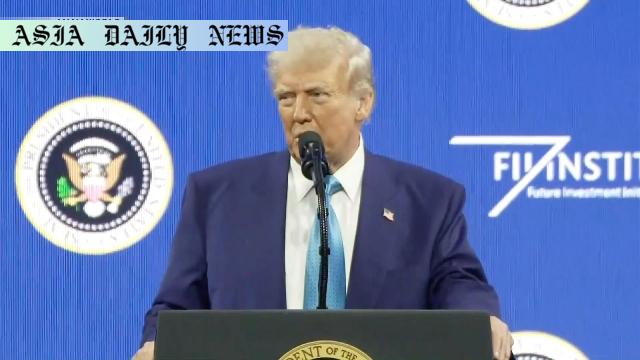Nuclear Weapons: Trump stresses the destruction nuclear arms can cause, citing Hiroshima and Nagasaki as examples.
Trump cites Hiroshima and Nagasaki to underline nuclear risk.
Warns against nations like Iran acquiring nuclear arms.
Expresses optimism on nuclear arms control with Russia, China.

Introduction: The Immense Power of Nuclear Weapons
During a speech in Florida, US President Donald Trump addressed the grave issue of nuclear weapons and their historical implications. By referencing the devastating impact of the bombings of Hiroshima and Nagasaki, Trump emphasized the immense destructive strength of nuclear power, reminding the world of its potential to obliterate humanity. Highlighting an urgent need for global cooperation, Trump insisted that nations such as Iran must not possess nuclear arms.
Hiroshima and Nagasaki: A Chilling Reminder
In his speech, Trump drew the world’s attention to a somber chapter in history. The atomic bombings of Hiroshima and Nagasaki during World War II serve as stark reminders of the devastation that nuclear weapons can cause, with lives lost in the hundreds of thousands and cities left in ruin. Trump underscored that a recurrence of such an event would lead to global destruction, a sentiment echoed by many leaders and scientists worldwide. By citing past examples, he sought to illustrate the urgency of preventing further proliferation.
Addressing Threats: The Concern Over Iran
Trump explicitly mentioned Iran in his remarks, emphasizing that certain nations cannot be allowed to develop nuclear capabilities. As tensions surrounding Iran’s nuclear ambitions continue to grow, the president reinforced the importance of strict international protocols and joint efforts to curtail such developments. The statement reflects longstanding US policy to prevent nuclear proliferation in sensitive regions, especially where political instability and extremist threats are present.
Global Collaboration: Talks with Russia and China
Despite the challenges posed by nuclear proliferation, Trump expressed optimism regarding nuclear arms reduction. He referenced his previous successful discussions with Russian President Vladimir Putin and Chinese President Xi Jinping. These two nations, possessing the largest nuclear arsenals in the world, play a pivotal role in arms control. Trump pointed out that China’s nuclear capabilities are expected to grow significantly in the coming years, making it an essential actor in upcoming negotiations.
The Importance of Leadership Understanding Nuclear Risks
Trump’s statement, “You just want somebody as your leader that understands that we just can’t let that happen,” emphasizes the necessity of informed, decisive leadership in tackling the nuclear threat. The responsibilities of global leaders have grown exponentially in an era where advancements in weaponry escalate risks. Trump called for urgent measures to ensure that no additional nations, including Iran, acquire such destructive power.
Moving Forward: Hope and Challenges
While challenges abound in the realm of nuclear proliferation, Trump’s speech suggested a sense of hope and responsibility. He reiterated his belief that through diplomacy and strategic negotiations, nations like the US, China, and Russia could set an example for reducing nuclear arsenals and encouraging global safety. The path forward involves balancing geopolitical tensions, fostering trust, and ensuring compliance with disarmament treaties.
Conclusion: A Call for Global Awareness
Trump’s emphasis on nuclear weapons serves as a reminder of both the mistakes of the past and the necessity of vigilance for the future. By referencing Hiroshima and Nagasaki, he highlighted the catastrophic consequences of misuse, urging nations to act collectively to prevent nuclear proliferation. The issue of nuclear arms is profoundly complex, requiring careful diplomacy, informed leadership, and unwavering global commitment.
Commentary
The Grave Responsibility of Addressing Nuclear Proliferation
President Trump’s remarks on nuclear weapons, invoking the tragedies of Hiroshima and Nagasaki, resonate as a stark reminder of humanity’s error-laden interaction with technology of mass destruction. The use of these weapons in history has left an indelible mark, underscoring why leaders today must tread carefully and act decisively to prevent similar events from recurring. Trump’s focus on this pressing global issue is commendable, as it brings attention to the importance of nuclear arms control amid modern geopolitical uncertainties.
Leadership and Global Cooperation Amid Growing Tensions
One aspect of Trump’s speech that stands out is his emphasis on informed leadership when it comes to nuclear risks. This suggestion addresses a greater truth about the complexities of international relations and the role of diplomacy. His willingness to engage in nuclear reduction discussions with leaders like Putin and Xi demonstrates an understanding of the shared responsibility nations bear in ensuring global safety. That said, challenges remain, particularly as newer players such as Iran and North Korea pose significant hurdles to arms control efforts.
Balancing Past Lessons with Future Strategies
The mention of historical tragedies alongside forward-looking solutions creates a compelling narrative. It bridges the gap between the lessons of the past and the strategies required for the future. However, addressing nuclear proliferation demands more than rhetoric; it requires consistent action, credible policies, and international alliances. As the world watches the dialogue between powerful nations unfold, one hopes for tangible outcomes that prioritize humanity’s safety over political gains.


